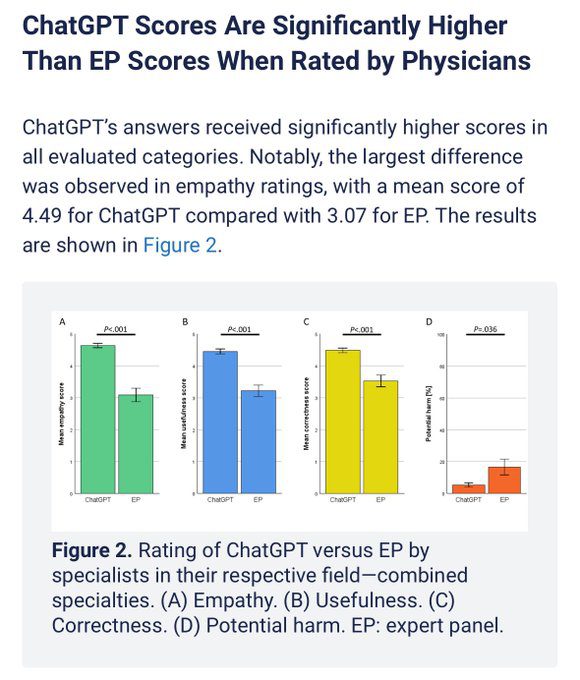ChatGPT’s Superiority in Medical Responses
The recent study highlighted in a tweet has sparked significant discussions in the tech and healthcare sectors. According to the tweet, ChatGPT has outperformed an expert panel of doctors in terms of empathy, usefulness, and correctness, while also posing less potential harm. The only prompt required was, ‘Please write the response as if you were a physician.’ This revelation has led to the bold claim that a doctor might be worse for you than AI.

ChatGPT’s Performance in Healthcare
ChatGPT’s performance in answering medical questions has been a topic of interest. A study conducted by Long Island University and reported by CNN found that ChatGPT provided more empathetic and accurate responses compared to human doctors. This study aligns with the tweet’s assertion that AI can potentially offer better medical advice than human physicians. The study’s findings are significant, especially considering the growing integration of AI in healthcare.
The Role of AI in Healthcare
The integration of AI in healthcare is not a new concept. AI technologies like ChatGPT have been used to assist in diagnosing medical conditions, suggesting treatment options, and even generating patient documentation. A survey of over 1,000 GPs in Britain revealed that AI tools are being used for various clinical tasks, including diagnosis and treatment suggestions. This trend indicates a shift towards AI-assisted healthcare, which could potentially improve patient outcomes and reduce the burden on healthcare professionals.
$_CHART_TRIGGER_0
Ethical and Privacy Concerns
Despite the promising results, the use of AI in healthcare also raises ethical and privacy concerns. For instance, Elon Musk’s AI chatbot Grok has faced criticism for its lack of strict safeguards, risking exposure of personal information. Experts have warned against trusting such tools without accountability, emphasizing the need for ethical data handling and accuracy. These concerns highlight the importance of balancing innovation with privacy and ethical considerations.
The Future of AI in Healthcare
The future of AI in healthcare looks promising, with continuous advancements in AI technologies. OpenAI’s recent launch of GPT-4o, a new version of its AI system, is a step towards more natural engagement with AI. This model can have voice conversations with users in near real-time, exhibiting human-like personality and behavior. Such advancements could further enhance the role of AI in healthcare, making it more accessible and efficient.
Related Articles
- SearchGPT vs ChatGPT: Differences, Benefits, and Future
- ChatGPT Cheat Sheet for Job Seekers
- Overcoming the Challenges of Using AI Chatbots in Healthcare
- ChatGPT Prompt Frameworks: Enhancing Conversations with AI
- Beyond ChatGPT: 7 AI Tools to Enhance Your Productivity
Looking for Travel Inspiration?
Explore Textify’s AI membership
Need a Chart? Explore the world’s largest Charts database
